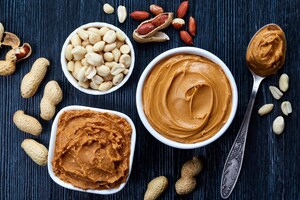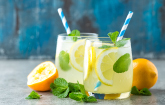
ALBANY, Ga., Oct. 14, 2025 /PRNewswire/ -- Snacking is a way of life in the United States. In fact, it's reported that 95% of adults and 93% of children have at least one snack a day. However, it's important to avoid the "snack trap" of grabbing a quick bag of chips or sports drink. Those types of carb-heavy, sugary snacks deliver a short-term energy boost that's quickly followed by a "crash." Plus, they're caloric and lack nutrients.
"If you snack, it's important to consume a small amount of something healthy," says Dr. Samara Sterling, a nutrition scientist and director of research for The Peanut Institute. "Be sure to choose nutrient-dense foods like plain yogurt, nuts, fresh fruits or raw vegetables. These items can round out your diet and help keep you energized the entire day."
Advantages of Snacking
According to the Harvard T.H. Chan School of Public Health, properly proportioned snacks throughout the day can lead to some big benefits, including:
- More energy: A quick snack can help boost glucose levels between meals.
- Less overeating: A few bites can curb a person's appetite and prevent overeating at mealtime.
- Extra nutrients: With smart snacks like raw veggies or peanuts, the body is getting a variety of the nutrients it needs.1
Peanut Power
For snacking purposes, it's important to know that just one serving of peanuts (about a handful) delivers seven grams of protein along with 19 vitamins and minerals. In fact, peanuts are considered an energy-dense food thanks to the plant-based protein and healthy fats they contain. That means the body taps into them for long-lasting fuel.2 In addition to body benefits, studies have found that eating peanuts can give the brain a boost. Peanuts and peanut butter deliver:
- All-day fuel: Because of their unique mix of plant-based protein, fiber and health fats, the body can use peanuts to power through the day—especially when paired with other healthy foods, like peanut butter on multigrain toast.2
- Less stress, better memory: A 2021 study found daily peanut or peanut butter consumption was associated with improved memory, decreased anxiety and depression and lower stress.3
- Long-term health: Eating peanuts has been associated with a 21% reduced risk of premature death,4 and a 24% lower risk of death from heart disease.5
- Reduced cancer risk: Including colorectal, gastric, pancreatic and lung cancers.6
- Weight management: A considerable amount of evidence shows incorporating peanuts and peanut butter into an individual's diet may help with weight loss. Peanut consumption may also support those who are taking a GLP-1 medication.
"Oftentimes snacking is an attempt to hold yourself over between meals," says Dr. Sterling. "Since peanuts are high in three macronutrients – protein, fiber and healthy monounsaturated and polyunsaturated fats – they deliver satiety by helping you feel fuller longer. You're also getting a significant boost of nutrition in just a small amount."
To "plus up" a snack, consider pairing peanuts and peanut butter with other healthy foods. A small handful of homemade trail mix with peanuts, rolled oats and raisins can be eaten mid-morning or after dinner while apple slices dipped in peanut butter and crushed peanuts can be an afternoon snack.
For tasty recipes that include peanuts and peanut butter and health news, visit PeanutInstitute.com or follow Facebook, Twitter, Instagram, LinkedIn and Pinterest.
Based in Albany, Ga., The Peanut Institute is a non-profit organization supporting nutrition research and developing educational programs to encourage healthful lifestyles that include peanuts and peanut products. The Peanut Institute pursues its mission through research programs, educational initiatives and the promotion of healthful lifestyles to consumers of all ages. As an independent forum, The Peanut Institute is uniquely positioned to work with all segments of the food industry, the research community, academia, consumer organizations and governmental institutions.
Sources:
- The Science of Snacking. The Nutrition Source - Harvard Chan School. (2024, November 15). Retrieved 2025, September 25. https://nutritionsource.hsph.harvard.edu/snacking/.
- Arya SS, Salve AR, Chauhan S. Peanuts as functional food: a review. J Food Sci Technol. 2016 Jan;53(1):31-41. doi: 10.1007/s13197-015-2007-9. Epub 2015 Sep 19. Review. PubMed PMID: 26787930; PubMed Central PMCID: PMC4711439.
- Parilli-Moser, I., et al., Consumption of peanut products improves memory and stress response in healthy adults from the ARISTOTLE study: A 6-month randomized controlled trial. Clinical Nutrition, 2021.https://doi.org/10.1016/j.clnu.2021.09.020
- Luu HN, Blot WJ, Xiang YB, et al. Prospective evaluation of the association of nut/peanut consumption with total and cause-specific mortality [published correction appears in JAMA Intern Med. 2016 Aug 1;176(8):1236]. JAMA Intern Med. 2015;175(5):755-766. doi:10.1001/jamainternmed.2014.8347.
- Alper CM, Mattes RD. Effects of chronic peanut consumption on energy balance and hedonics. Int J Obes Relet Metab Disord. 2002 Aug;26(8):1129-37. doi: 10.1038/sj.ijo.0802050. PMID: 12119580.
- Zhang D, Dai C, Zhou L, et al. Meta-analysis of the association between nut consumption and the risks of cancer incidence and cancer-specific mortality. Aging (Albany NY).
SOURCE The Peanut Institute








Share this article